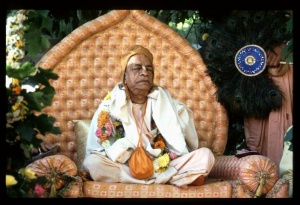CC Madhya 2.25: Difference between revisions
m (1 revision(s)) |
(Vanibot #0054 edit - transform synonyms into clickable links, which search similar occurrences) |
||
| (One intermediate revision by one other user not shown) | |||
| Line 1: | Line 1: | ||
{{ | [[Category:Sri Caitanya-caritamrta - Madhya-lila Chapter 02|C025]] | ||
<div style="float:left">'''[[Sri Caitanya-caritamrta|Śrī Caitanya-caritāmṛta]] - [[CC Madhya|Madhya-līlā]] - [[CC Madhya 2|Chapter 2: The Ecstatic Manifestations of Lord Śrī Caitanya Mahāprabhu]]'''</div> | |||
<div style="float:right">[[File:Go-previous.png|link=CC Madhya 2.24|Madhya-līlā 2.24]] '''[[CC Madhya 2.24|Madhya-līlā 2.24]] - [[CC Madhya 2.26|Madhya-līlā 2.26]]''' [[File:Go-next.png|link=CC Madhya 2.26|Madhya-līlā 2.26]]</div> | |||
{{CompareVersions|CC|Madhya 2.25|CC 1975|CC 1996}} | |||
{{RandomImage}} | |||
==== TEXT 25 ==== | ==== TEXT 25 ==== | ||
<div | <div class="verse"> | ||
śata vatsara paryanta, jīvera jīvana anta, | :śata vatsara paryanta, jīvera jīvana anta, | ||
ei vākya kaha nā vicāri’ | :ei vākya kaha nā vicāri’ | ||
nārīra yauvana-dhana, yāre kṛṣṇa kare mana, | :nārīra yauvana-dhana, yāre kṛṣṇa kare mana, | ||
se yauvana-dina dui-cāri | :se yauvana-dina dui-cāri | ||
</div> | </div> | ||
| Line 14: | Line 18: | ||
==== SYNONYMS ==== | ==== SYNONYMS ==== | ||
<div | <div class="synonyms"> | ||
śata vatsara | ''[//vanipedia.org/wiki/Special:VaniSearch?s=śata&tab=syno_o&ds=1 śata] [//vanipedia.org/wiki/Special:VaniSearch?s=vatsara&tab=syno_o&ds=1 vatsara] [//vanipedia.org/wiki/Special:VaniSearch?s=paryanta&tab=syno_o&ds=1 paryanta]'' — up to one hundred years; ''[//vanipedia.org/wiki/Special:VaniSearch?s=jīvera&tab=syno_o&ds=1 jīvera]'' — of the living entity; ''[//vanipedia.org/wiki/Special:VaniSearch?s=jīvana&tab=syno_o&ds=1 jīvana]'' — of the life; ''[//vanipedia.org/wiki/Special:VaniSearch?s=anta&tab=syno_o&ds=1 anta]'' — the end; ''[//vanipedia.org/wiki/Special:VaniSearch?s=ei&tab=syno_o&ds=1 ei] [//vanipedia.org/wiki/Special:VaniSearch?s=vākya&tab=syno_o&ds=1 vākya]'' — this word; ''[//vanipedia.org/wiki/Special:VaniSearch?s=kaha&tab=syno_o&ds=1 kaha]'' — you speak; ''[//vanipedia.org/wiki/Special:VaniSearch?s=nā&tab=syno_o&ds=1 nā]'' — without; ''[//vanipedia.org/wiki/Special:VaniSearch?s=vicāri’&tab=syno_o&ds=1 vicāri’]'' — making consideration; ''[//vanipedia.org/wiki/Special:VaniSearch?s=nārīra&tab=syno_o&ds=1 nārīra]'' — of a woman; ''[//vanipedia.org/wiki/Special:VaniSearch?s=yauvana&tab=syno_o&ds=1 yauvana]-[//vanipedia.org/wiki/Special:VaniSearch?s=dhana&tab=syno_o&ds=1 dhana]'' — the wealth of youthfulness; ''[//vanipedia.org/wiki/Special:VaniSearch?s=yāre&tab=syno_o&ds=1 yāre]'' — in which; ''[//vanipedia.org/wiki/Special:VaniSearch?s=kṛṣṇa&tab=syno_o&ds=1 kṛṣṇa]'' — Lord Kṛṣṇa; ''[//vanipedia.org/wiki/Special:VaniSearch?s=kare&tab=syno_o&ds=1 kare]'' — does; ''[//vanipedia.org/wiki/Special:VaniSearch?s=mana&tab=syno_o&ds=1 mana]'' — intention; ''[//vanipedia.org/wiki/Special:VaniSearch?s=se&tab=syno_o&ds=1 se] [//vanipedia.org/wiki/Special:VaniSearch?s=yauvana&tab=syno_o&ds=1 yauvana]'' — that youthfulness; ''[//vanipedia.org/wiki/Special:VaniSearch?s=dina&tab=syno_o&ds=1 dina]'' — days; ''[//vanipedia.org/wiki/Special:VaniSearch?s=dui&tab=syno_o&ds=1 dui]-[//vanipedia.org/wiki/Special:VaniSearch?s=cāri&tab=syno_o&ds=1 cāri]'' — two or four. | ||
</div> | </div> | ||
| Line 21: | Line 25: | ||
==== TRANSLATION ==== | ==== TRANSLATION ==== | ||
<div | <div class="translation"> | ||
“‘A human being does not live more than a hundred years. You should also consider that the youthfulness of a woman, which is the only attraction for Kṛṣṇa, remains for only a few days. | “‘A human being does not live more than a hundred years. You should also consider that the youthfulness of a woman, which is the only attraction for Kṛṣṇa, remains for only a few days. | ||
</div> | </div> | ||
__NOTOC__ | |||
<div style="float:right; clear:both;">[[File:Go-previous.png|link=CC Madhya 2.24|Madhya-līlā 2.24]] '''[[CC Madhya 2.24|Madhya-līlā 2.24]] - [[CC Madhya 2.26|Madhya-līlā 2.26]]''' [[File:Go-next.png|link=CC Madhya 2.26|Madhya-līlā 2.26]]</div> | |||
__NOTOC__ | |||
__NOEDITSECTION__ | |||
Latest revision as of 22:33, 19 February 2024
Śrī Caitanya-caritāmṛta - Madhya-līlā - Chapter 2: The Ecstatic Manifestations of Lord Śrī Caitanya Mahāprabhu

His Divine Grace
A.C. Bhaktivedanta Swami Prabhupada
A.C. Bhaktivedanta Swami Prabhupada
TEXT 25
- śata vatsara paryanta, jīvera jīvana anta,
- ei vākya kaha nā vicāri’
- nārīra yauvana-dhana, yāre kṛṣṇa kare mana,
- se yauvana-dina dui-cāri
SYNONYMS
śata vatsara paryanta — up to one hundred years; jīvera — of the living entity; jīvana — of the life; anta — the end; ei vākya — this word; kaha — you speak; nā — without; vicāri’ — making consideration; nārīra — of a woman; yauvana-dhana — the wealth of youthfulness; yāre — in which; kṛṣṇa — Lord Kṛṣṇa; kare — does; mana — intention; se yauvana — that youthfulness; dina — days; dui-cāri — two or four.
TRANSLATION
“‘A human being does not live more than a hundred years. You should also consider that the youthfulness of a woman, which is the only attraction for Kṛṣṇa, remains for only a few days.